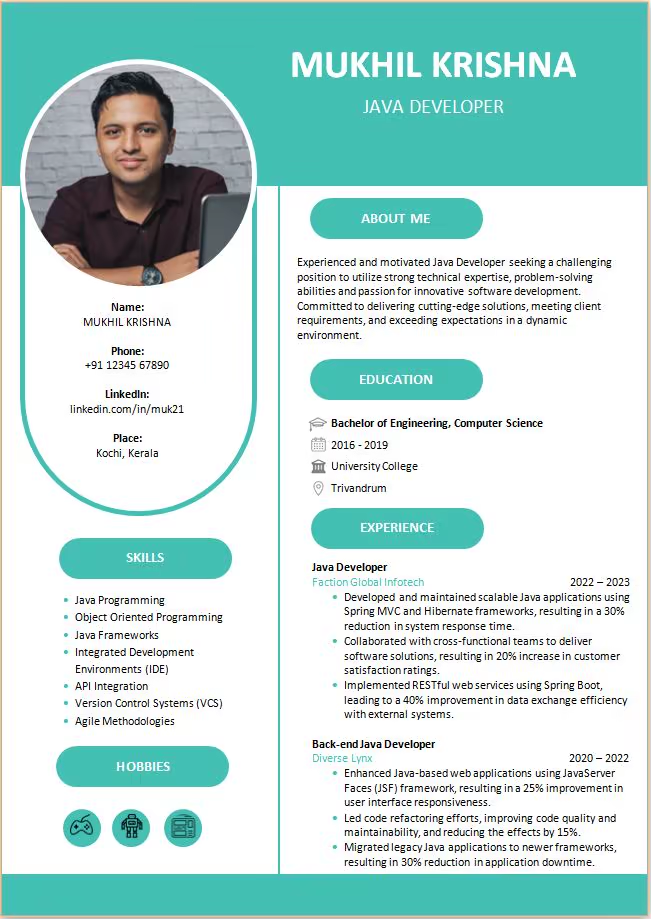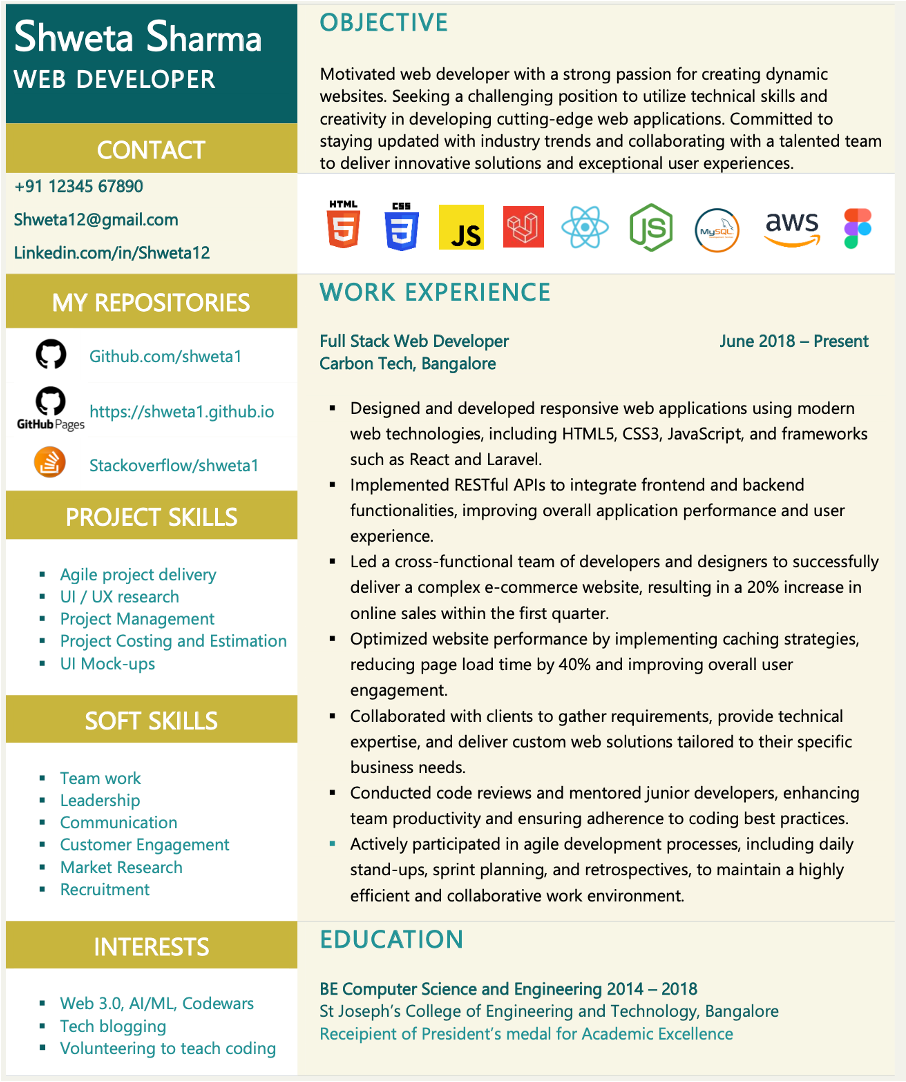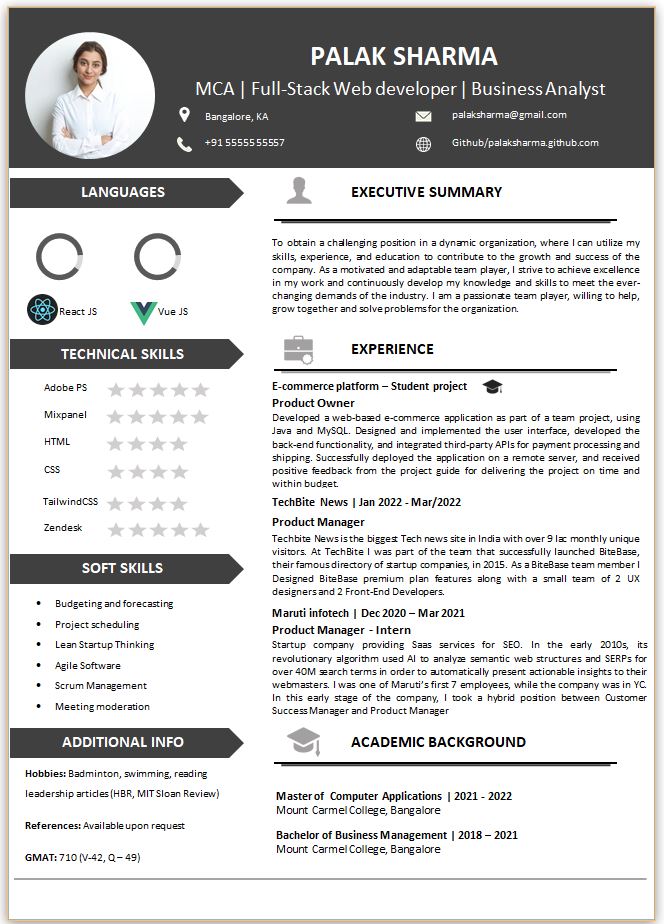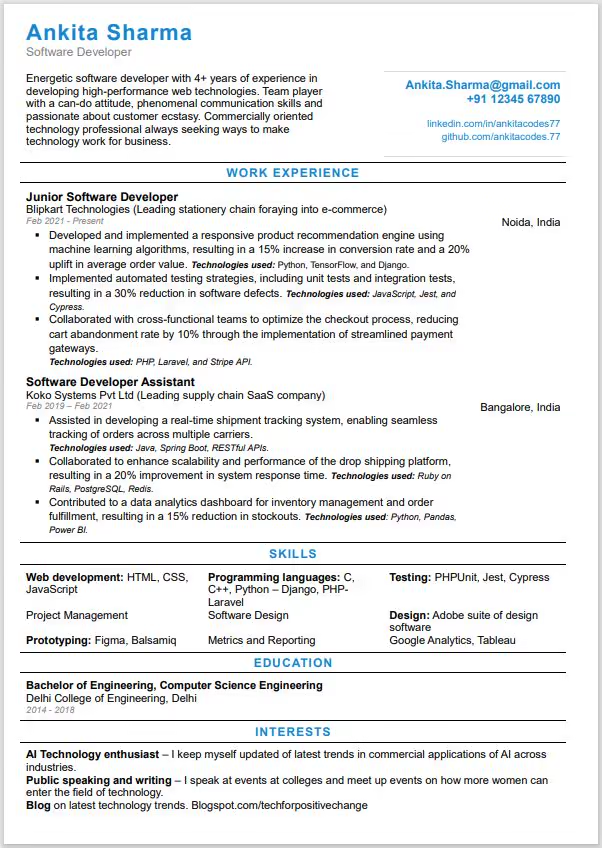Modern Resume
Java Developer Resume
Java Developer
JavaD


Objective
Here are some sample career objective statements if you are an experienced java developer.
Objective statement sample 1 -
Experienced and motivated Java Developer seeking a challenging position to utilize strong technical expertise, problem-solving abilities and passion for innovative software development. Committed to delivering cutting-edge solutions, meeting client requirements, and exceeding expectations in a dynamic environment.
Objective statement sample 2 -
Results-driven Java developer with over 5 years of experience in designing, developing, and implementing high-performance applications. Seeking a challenging role where I can leverage my expertise in Java, along with my strong problem-solving skills, to contribute to innovative software solutions. Passionate about collaborating with cross-functional teams to deliver top-notch software products that exceed client expectations.
If you are a fresh college graduate, you might want to consider using this objective statement below.
Objective statement sample 3 -
Enthusiastic Computer Science graduate eager to launch a career as a junior Java developer. Eager to apply the theoretical knowledge gained during my studies to real-world development projects. Offering a solid foundation in Java programming, object-oriented principles, and a willingness to learn and adapt. Excited to contribute my energy, creativity, and determination to a dynamic development team and grow as a professional Java developer.
Education
BE Computer Science, ME Computer Science, BCA Bachelor of Computer Applications, MCA Master of Computer Applications
Skills
Consider including these critical skills on your resume that is aimed at securing developer jobs. here's a brief comment on why each of these skills is valuable to include on a Java developer's resume:
Java Programming:
This is the core skill for a Java developer. Proficiency in Java programming showcases your ability to write clean, efficient, and functional code using the language that is fundamental to the job.
Object-Oriented Programming:
Object-oriented principles like encapsulation, inheritance, and polymorphism are essential for designing modular, maintainable, and extensible software systems. Demonstrating your understanding of OOP highlights your ability to create well-organized and scalable codebases.
Java Frameworks:
Knowledge of Java frameworks like Spring, Hibernate, or JavaFX indicates your familiarity with tools that streamline development and enhance code reusability. Frameworks are widely used in real-world projects to expedite development processes.
Integrated Development Environments (IDE):
Proficiency with IDEs such as IntelliJ IDEA, Eclipse, or NetBeans indicates your ability to efficiently write, debug, and test Java code. Strong IDE skills enhance productivity and collaboration within development teams.
API Integration:
API (Application Programming Interface) integration involves connecting different software components to enable them to work together. Demonstrating expertise in API integration showcases your ability to create seamless interactions between various systems.
Version Control Systems (VCS):
Version control, often managed through systems like Git, is crucial for collaborative coding. Knowledge of VCS demonstrates your ability to work in teams, manage code changes, and ensure codebase integrity.
Agile Methodologies:
Agile methodologies, like Scrum or Kanban, emphasize iterative and collaborative development. Familiarity with Agile methodologies shows your adaptability to dynamic project environments and your ability to deliver incremental improvements efficiently. These skills collectively demonstrate a well-rounded Java developer who can write effective code, design scalable applications, collaborate within teams, and follow modern development practices.
Projects
If you are still in college or about to graduate, consider working on Java projects that are representative of projects that are pursued in the industry.
Here are two sample projects for you to consider working on.
Project 1. Online Bookstore Management System:
Description: Create a web-based application that simulates an online bookstore. Users should be able to browse and search for books, add them to their cart, and proceed to checkout. Admins should be able to manage inventory, add new books, and view sales reports.
Results:
Demonstrates proficiency in Java programming, especially in creating interactive web applications.
Shows understanding of database management, as the project would require integrating a database to store book information, user details, and purchase history.
Highlights knowledge of Java frameworks (such as Spring Boot) for building web applications.
Illustrates proficiency in front-end technologies like HTML, CSS, and JavaScript for creating a user-friendly interface.
Provides hands-on experience in system design, user authentication, and data manipulation.
Project 2. Task Management Desktop Application:
Description: Develop a desktop application for managing tasks and to-do lists. Users should be able to add, edit, and delete tasks, set deadlines, prioritize tasks, and mark them as completed. The application could include features like reminders and task categorization.
Results:
Demonstrates Java programming skills in building a user-friendly desktop application.
Exhibits understanding of object-oriented programming (OOP) principles for designing efficient and maintainable code.
Shows proficiency in graphical user interface (GUI) development using Java Swing or JavaFX.
Highlights experience in handling user input, data storage, and task management functionalities.
Demonstrates the ability to create well-structured and organized codebase, considering features like task prioritization and sorting.
Showcases problem-solving skills through implementing features like reminders and notifications.
Both of these projects provide hands-on experience in various aspects of software development and Java programming. They showcase a student's ability to design, code, and implement practical solutions, which are valuable skills for a future career as a Java developer.
Interests/Hobbies
You should consider making the most of the interests and hobbies on your resume. On our resume, you will see that we used icons instead of text, but feel free to change to a list of hobbies.
Here list of 10 hobbies/interests that could be relevant and interesting to include on a Java developer's resume:
Open Source Contributions: Demonstrates your commitment to the coding community and your willingness to contribute to shared projects.
Algorithmic Problem Solving: Shows your passion for enhancing your problem-solving skills and tackling complex coding challenges.
Tech Blogging: Indicates your ability to communicate technical concepts effectively and your dedication to staying updated with industry trends.
Hackathons: Highlights your enthusiasm for rapid development, innovation, and teamwork within time-constrained environments.
Code Refactoring: Reveals your dedication to writing clean, optimized code and improving existing systems.
Reading Tech Literature: Shows your commitment to continuous learning and staying informed about advancements in software development.
Personal Coding Projects: Illustrates your proactive approach to learning and applying new technologies independently.
Participation in Tech Meetups/Conferences: Reflects your engagement in the developer community and your eagerness to network and learn from others.
Programming Puzzles: Demonstrates your love for intellectual challenges and your ability to think critically and creatively.
Robotics or IoT Projects: Highlights your interest in applying programming skills to real-world projects like automation, robotics, or Internet of Things devices.
Experience
Java Developer
Faction Global Infotech 2022 – 2023
• Developed and maintained scalable Java applications using Spring MVC and Hibernate frameworks, resulting in a 30% reduction in system response time.
• Collaborated with cross-functional teams to deliver software solutions, resulting in 20% increase in customer satisfaction ratings.
• Implemented RESTful web services using Spring Boot, leading to a 40% improvement in data exchange efficiency with external systems.
Back-end Java Developer
Diverse Lynx 2020 – 2022
• Enhanced Java-based web applications using JavaServer Faces (JSF) framework, resulting in a 25% improvement in user interface responsiveness.
• Led code refactoring efforts, improving code quality and maintainability, and reducing the effects by 15%.
• Migrated legacy Java applications to newer frameworks, resulting in 30% reduction in application downtime.
Additional Inputs
Well if you are wondering which language / technology to become to start learning to code, we would just that you consider Java. Working on Java projects as a student, even if you're not entirely sure about becoming a Java developer, offers numerous benefits that can greatly enhance your chances of securing your first job in the software development field:
Hands-On Experience: Practical projects provide a tangible way to apply the theoretical knowledge you've gained in your studies. It's an opportunity to put concepts into action and see how they work in real-world scenarios.
Demonstrates Skills: Having concrete projects on your resume demonstrates your ability to create functional applications, which is a strong selling point to potential employers. It showcases your technical skills, problem-solving abilities, and initiative.
Portfolio Building: Creating a portfolio of projects is an excellent way to showcase your work to potential employers. A strong portfolio can set you apart from other candidates, especially if the projects highlight your versatility, creativity, and the range of technologies you've used.
Learning by Doing: Practical projects provide a space for experimentation and learning from mistakes. You gain insights into best practices, coding standards, and efficient techniques by facing real-world challenges.
Exposure to Tools and Frameworks: When you work on projects, you often encounter tools, libraries, and frameworks commonly used in the industry. This exposure makes you more familiar with the tech stack that's in demand among employers.
Problem-Solving Skills: Developing projects requires troubleshooting, debugging, and critical thinking. These skills are highly valued in the tech industry and are transferable across various roles and technologies.
Networking Opportunities: While working on projects, you might engage with other students, mentors, or professionals who can offer guidance and advice. Networking can lead to opportunities like internships, referrals, or job recommendations.
Career Clarity: Engaging in practical projects helps you explore your interests and preferences. Even if you're unsure about being a Java developer, the skills and experience gained can be useful in other development roles.
Interview Performance: When you discuss your projects during interviews, it demonstrates your passion for learning and your commitment to the field. It gives interviewers concrete examples to assess your skills and potential fit for their team.
Personal Growth: Completing projects boosts your confidence, as you'll see your skills improve and your creations come to life. This sense of achievement can be motivating and affirming as you consider your career path.
In the competitive world of software development, practical experience is highly valued. Even if you're uncertain about specializing as a Java developer, the skills and knowledge gained from Java projects can be transferred to various roles within the tech industry. The ability to code, problem-solve, and create functional software solutions is universally applicable and appealing to potential employers.
Why this template works
Like all of our other templates for developers, this is a very simple and light template that is easy to update, maintain and share with recruiters. Given the simplicity of the design, you can practically get your resume ready in under 30 min.


